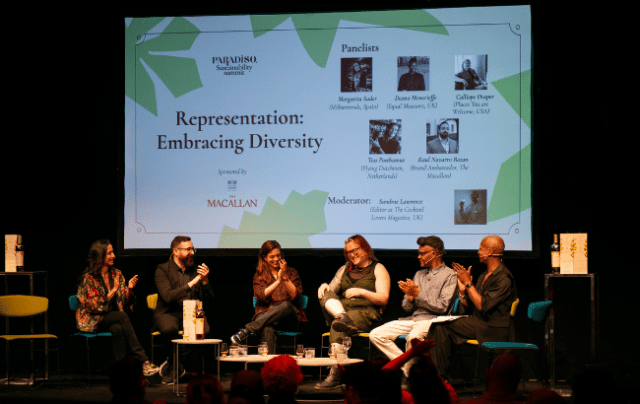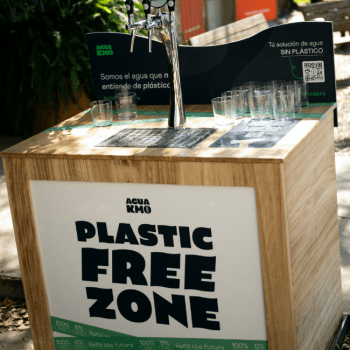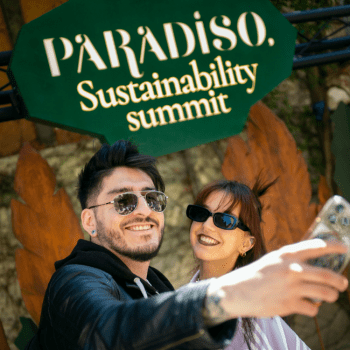How Paradiso aims to better the planet
Some of the world’s leading bartenders met in Barcelona to focus on better, more sustainable ways of working, and our bars editor Lauren Bowes went out to join them.

*This feature was first published in the May 2025 issue of The Spirits Business magazine.
Having established itself as one of the world’s best bars, Paradiso in Barcelona is now taking on the challenge of bettering the planet. On 30 March, founder Giacomo Giannotti hosted the fourth edition of the Paradiso Sustainability Summit, bringing together some of the world’s most forward‐thinking bartenders and advocates for a day of talks, ideas and innovation at the city’s Palo Alto venue.
The summit has come a long way from its humble beginnings as a few masterclasses in the back of the bar. “I never thought it would become this big,” said Giannotti, “but I dreamed of one day having some of the best bars in the world here with us, talking about the serious topics of our industry, to try to bring to the table a positive solution.”
Between panels, guests explored a curated Cocktail Festival, featuring creations from top bars around the globe. Alongside hometown hero Paradiso and Madrid’s Angelita, the line‐ up included names like Singapore’s Fura and Bar Leone from Hong Kong.
Waste reduction
The first talk of the day tackled the topic of waste. On reducing waste in cocktails, Iain McPherson of Edinburgh’s Panda & Sons said the team “usually come up with an idea first, then we look at how to make it more efficient”. Known for its use of freeze‐drying – not the most sustainable technique, McPherson admitted – the bar now uses it to preserve surplus citrus juice, giving it a shelf life of up to 30 years. Outside of sustainability, McPherson thinks this could open the door to citrus vintages – which Juliane Caillouette Noble, managing director at the Sustainable Restaurant Association, noted might reflect annual climate change.

Working in venues such as London’s Dandelyan and Silver Lyan in Washington DC opened Bar Leone’s Lorenzo Antinori’s eyes to the possibilities of sustainability: “We can look at things from a different angle and base our ideas on making the right choices – not necessarily making sacrifices.” Bar Leone’s minimalist approach came from necessity but has since proven to be a strength. “Sometimes I realise that maybe doing less is actually the key to solving a lot of problems,” said Antinori.
Later, panellists debated whether consumers really care about a bar’s sustainability initiatives. For Hampus Thunholm, co‐owner of Röda Huset in Stockholm, it’s complex. “It’s very personal, and about where you’re from, and how your country is approaching this question,” he said. Sweden, he noted, is ahead of many others environmentally, which he believes is reflected in his guests’ curiosity.
Generational divide
Sasha Wijidessa, co‐owner of Fura, noted a generational divide, with younger drinkers more likely to take an interest. But, she said: “Sustainability shouldn’t be a unique selling point. I don’t see the importance in conveying the message. You start to see real change when we stop thinking of it as ‘this is how we sell something’, and start thinking of it as setting systems in place.”
Also up for discussion were two often overlooked bar resources: glass and ice. Alex Francis of De Vie in Paris and Mario Villalón of Angelita in Spain both operate iceless venues. At Angelita, Villalón opts for double‐walled glasses to keep pre‐chilled cocktails cool. Rather than framing the absence of ice as an environmental choice, he focuses on what it means for the guest’s experience: “The liquid will not dilute any further, keeping the same temperature for around half an hour – so the first and last sip of the liquid is the same.”
At Gleneagles in Scotland, the focus is more on the environmental cost of glassware. “In a luxury environment, glassware is very important,” explained head of bars Michele Mariotti. The hotel is replacing disposable garnishes with permanent design elements etched into the glass. The initiative began at its American Bar, and is now being rolled out throughout the resort – meaning thousands of drinks will no longer require a garnish.
The hotel has also launched a glass‐repair programme to give chipped glasses a new lease of life. “When we started the programme, there were about 50 glasses, but I was only able to repair 20 or so,” said assistant bar manager Andrea Gardiner. “I felt quite disappointed, but then I realised we’re making progress. We’re starting something new; failure is a part of it.”

But “sustainability is more than just waste”, as moderator Hannah Sharman‐Cox said, and the summit featured discussions about social sustainability too, including representation and diversity.
Equal Measures founder Deano Moncrieffe explained how his own unpleasant experiences drove him to create his platform: “I just didn’t want anybody else to be in a situation that I was in without having someone to speak to.”
For Callie Draper, founder of Places You Are Welcome, the motivation was similarly personal. “In Edmonton, where I live in Canada, to my knowledge I am the only out trans person working behind a bar,” she said. That perspective – and a historic win as the first trans person to win a global bar competition – gave Draper the clarity and drive to build something bigger.
“Seeing a lack of folks like me behind the bar, I knew it wasn’t because we weren’t there. It’s never because we’re not trying to do the work; it’s because the work we’re doing just isn’t always seen as valuable.”
Her platform now helps trans people build community and connections in the global bar industry.
While inclusion is often framed positively, Draper argued that real action can be uncomfortable. “Oftentimes the view about inclusion is making sure you say yes to absolutely everybody, but sometimes the biggest signal for building an inclusive space is learning when and how to say no,” she said. Challenging homophobic, transphobic or racist behaviour, she added, needs to be an intrinsic part of inclusion.
People-first approach
Empowering your staff also means adopting a people‐first approach. “Making the team happy makes the customer happy, which makes the business happy,” said Demie Kim from Seoul’s Zest. The bar avoids overworking staff, but Kim believes leading by example is the most important thing. “I want to show how I’m living my life well as someone’s husband and as someone’s father, as well as the bar leader. I believe they can get motivation from this – they can see the possibility of being part of this industry for the future.”
The Paradiso Sustainability Summit has grown into an important platform for some of the bar world’s most urgent conversations – not just about reducing waste, but about changing systems and rethinking priorities. From the practicalities of going iceless to the realities of representation behind the bar, the summit showed that meaningful progress comes from action, not just ideas. While there’s no one‐size‐fits‐all solution, events like this are a reminder that the industry has the tools – and the people – to drive change.
Related news
Takamaka sets a new standard in sustainability
